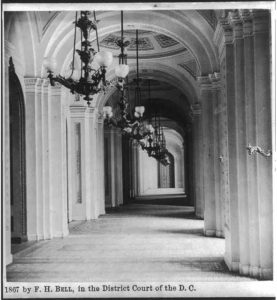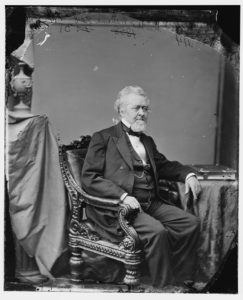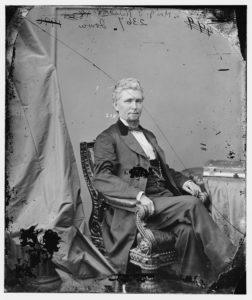On November 21, 1867 the Fortieth U.S. Congress reassembled amid a great deal of curiosity about the possible impeachment of President Andrew Johnson. The spectator section in the House was packed an hour before the start time, but the Judiciary Committee wasn’t ready to submit its report, so Congress adjourned until Monday the 25th. After a long weekend the House Judiciary submitted its report favoring impeachment of the president by a 5-4 vote.
The majority report was “a hodgepodge of charges centering on Johnson’s Reconstruction policies.” According to report author Thomas Williams (Republican from Pennsylvania) the several charges boiled down to one thing: “Every great abuse, every flagrant departure from the well settled principles of the government, which has been brought home to its present administration … is referrable to the one great overshadowing purpose of reconstructing the shattered governments of the rebel States in accordance with his own will.” Committee Chairman James F. Wilson (Republican from Iowa)wrote a minority report – he agreed that the president had acted improperly, but didn’t think the actions amounted to a crime. “The committee report was not a strong indictment …”[1]
___________________
In its November 26, 1867 issue The New-York Times agreed – unless new facts were presented the Judiciary Committee’s report wouldn’t amount to anything:
The Impeachment Question.
Unless the evidence gathered by the Judiciary Committee embraces facts altogether new to the country, the report recommending impeachment will amount to nothing. The allegations on which Mr. BOUTWELL, as the mouthpiece of the majority, relies to justify the measure and insure its success, are merely a rehash of charges again and again preferred during the progress of the reconstruction controversy, and always for political effect. No striking accusation appears – no terse statement of fact that can arouse popular feeling and reconcile it to a formal arraignment of the Executive. “An unconstitutional usurpation of power” in the organization of State Governments – a “denial of the right of Congress to control” reorganization – sins of omission and commission in connection with these positions: such are the leading counts in the indictment presented by Mr. BOUTWELL, and a sorry exhibit they form as a groundwork of impeachment. If partisan ingenuity can discover no offence more tangible than those here imputed, we may be quite sure that Mr. JOHNSON has little to fear from the recommendation which has been reported.
Our opinion has always been that something more convincing than the imputations of partisanship would be needed to warrant the extreme measure proposed. … [The president has “done and said many foolish things,” but the laws passed over his vetoes are “in smooth and peaceful operation” – proof that he hasn’t been trying to usurp the dictates of Congress. President Johnson’s behavior proves Congress needs to be vigilant and certain that its policy is being carried out, but it doesn’t prove any pretext for his removal. In fact, Congress is totally in charge so why fear the president’s actions for the rest of his term? Markets didn’t think the Republicans would pursue impeachment and therefore show it was “intent on committing suicide.”]
From the Library of Congress: House corridor; Messrs. Williams, Wilson, and Boutwell
- [1]Trefousse, Hans L. Andrew Johnson: A Biography. New York: W.W. Norton & Company, Inc., 1997. Print. page 301.↩




